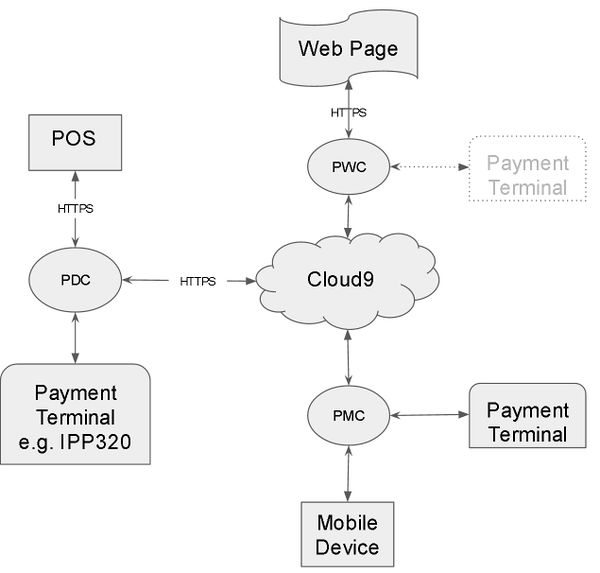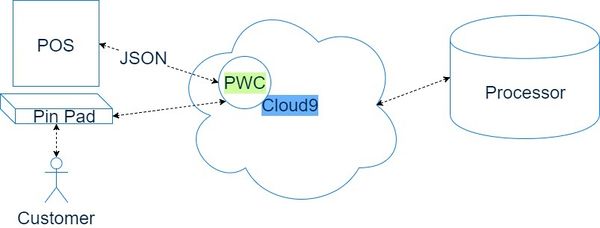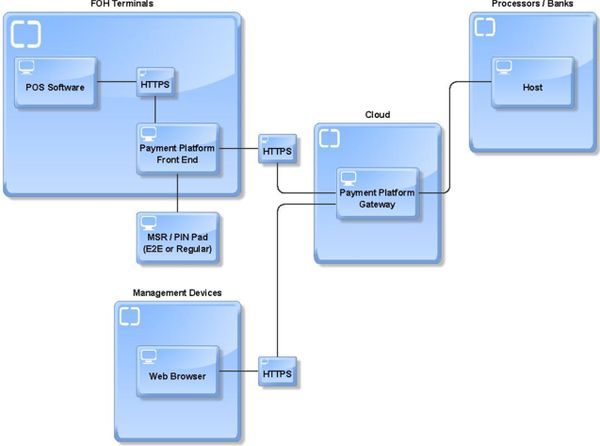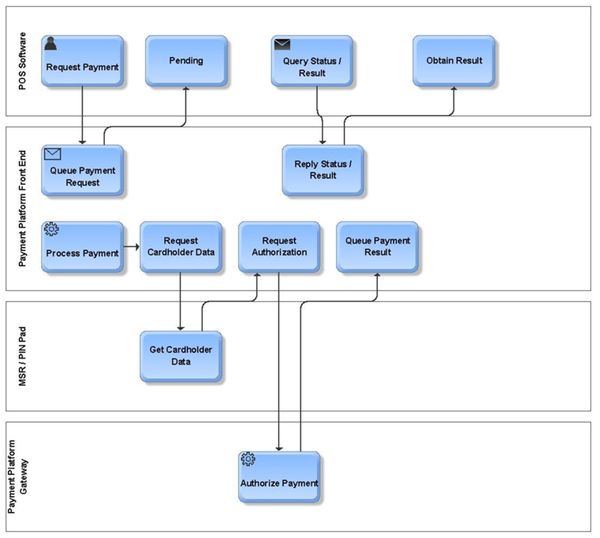Difference between revisions of "Payment Processing Developer Guide"
(→Services) |
(→Understanding AVS) |
||
| (78 intermediate revisions by the same user not shown) | |||
| Line 1: | Line 1: | ||
{{Template:C9Header|Developer Guide}} | {{Template:C9Header|Developer Guide}} | ||
| − | |||
| − | |||
=Environment & Client Options= | =Environment & Client Options= | ||
Being a cloud based system, Cloud9 has few restrictions on the integration options. | Being a cloud based system, Cloud9 has few restrictions on the integration options. | ||
The following are some of the possibilities: | The following are some of the possibilities: | ||
* Windows | * Windows | ||
| + | * Web Browser | ||
* Unix/Linux | * Unix/Linux | ||
* Android | * Android | ||
| − | * | + | * iOS |
* OS X | * OS X | ||
* Custom | * Custom | ||
| Line 20: | Line 19: | ||
==Payment Device Controller (PDC)== | ==Payment Device Controller (PDC)== | ||
| − | + | {{Template:PDC}} | |
| − | |||
=System & Process Diagrams= | =System & Process Diagrams= | ||
| Line 32: | Line 30: | ||
| | | | ||
|} | |} | ||
| − | |||
| − | |||
| − | |||
| − | |||
| − | |||
| − | |||
| − | |||
| − | |||
| − | |||
| − | |||
==Cloud9 Process Diagram== | ==Cloud9 Process Diagram== | ||
| Line 51: | Line 39: | ||
|} | |} | ||
| − | =Integration Options= | + | =Understanding AVS= |
| + | If you need to enforce AVS (Address Verification), you can set '''IgnoreAVSresult''' API option to '''N''' (NO). | ||
| + | If you do so, your software must use post processing to determine the reason for decline and proceed accordingly (not all decline reasons are critical in all conditions). | ||
| + | <br>We have an extensive list of AVS match options. | ||
| + | <br> See this link for: [https://developer.acquired.com/references/issuercodes#:~:text=Issuer%20Response%20Codes.%20Overview.%20We%20will]. | ||
| + | <br>'''The Flow''' | ||
| + | # AVS pass - ok? | ||
| + | # IF AVS NOT pass - check the AVS Response Code to decide if to proceed. | ||
| + | <br> | ||
| + | '''Please only check the first 5 digits of zip codes''' | ||
| + | |||
| + | =Integration Options and Working Samples= | ||
Please choose the integration scenario below, to dive into more detail: | Please choose the integration scenario below, to dive into more detail: | ||
| − | + | <br> | |
| − | + | {{Template:samples}} | |
| − | |||
| − | = | + | =Documentation= |
| − | + | [[Payment Processing API Documentation]] | |
| − | |||
| − | |||
| − | |||
| − | |||
| − | |||
| − | |||
| − | |||
| − | |||
| − | |||
| − | |||
| − | |||
| − | |||
{{Template:C9Footer|Integration}} | {{Template:C9Footer|Integration}} | ||
Latest revision as of 07:26, 13 September 2024
Cloud9 Payment Gateway Documentation. This site can also be reached at http://docs.cloud9paymentgateway.com
Contents
Environment & Client Options
Being a cloud based system, Cloud9 has few restrictions on the integration options. The following are some of the possibilities:
- Windows
- Web Browser
- Unix/Linux
- Android
- iOS
- OS X
- Custom
Services
Cloud9 Payment Gateway
Cloud9 is essentially a multi-merchant/multi processor switch. Cloud9 reduces the complexity of direct processor and payment terminal programming, certification and compliance by presenting a simple unified interface to the developer with numerous interface options. The core communications are conducted via TLS/SOAP/JSON with wrappers in C/C++/Java, if desired.
Back-Office Reporting Gateway
Cloud9 has a full suite of Back Office Reporting, which can be extended and scripted.
Payment Device Controller (PDC)
Optional Payment Device Controller (PDC) hides the complexity of low level communications with the payment terminals and adds Offline Store & Forward functionality, if desired.
The client (POS/web page/mobile device, etc) can communicate with the PDC, which will in turn control the payment perminal/pin pad and relate the processing instructions to the Cloud9 Payment Gateway.
This is the easiest form of integration and it is recommended.
Note: Variations of Payment Device Controller are Payment Mobile Controller (PMC) and Payment Web Controller (PWC), dealing with mobile and web based payment processing functionality respectively.
→ OPTION1: Local Payment Device Controller with Store and Forward Capability
| The client can communicate with a local Payment Device Controller (PDC) via SOAP, JSON or using the wizard like wrapper, written in C/C++/Java. |
→ OPTION2: No Local Software - Direct Cloud Connection to Cloud9 Payment Web Controller (PWC)
| The client can communicate directly with the cloud Payment Web Controller (PWC) via SOAP, JSON or using the wizard like wrapper, written in C/C++/Java. |
Payment Device Controller Setup
Please, see Cloud9 Payment Device Controller Setup
System & Process Diagrams
POS System Diagram
Cloud9 Process Diagram
Understanding AVS
If you need to enforce AVS (Address Verification), you can set IgnoreAVSresult API option to N (NO).
If you do so, your software must use post processing to determine the reason for decline and proceed accordingly (not all decline reasons are critical in all conditions).
We have an extensive list of AVS match options.
See this link for: [1].
The Flow
- AVS pass - ok?
- IF AVS NOT pass - check the AVS Response Code to decide if to proceed.
Please only check the first 5 digits of zip codes
Integration Options and Working Samples
Please choose the integration scenario below, to dive into more detail:
Web Browser Samples
Web Browser Integration Samples
RESTFul JSON/SOAP
MS Windows Samples
iOS Integration Samples
Android Integration Samples
Documentation
Payment Processing API Documentation
From the makers of Cloud9 Payment Processing Gateway and Creditline Credit Card Processing Software



